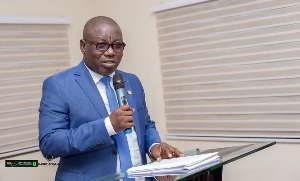Accra, April 11, GNA - Mr Joshua Alabi, Greater Accra Regional Minister, on Tuesday said previous and on-going efforts at land conservation show that even though attempts have been made in the past to introduce land management practices into the farming system, the impact have been lower than expected.
This, he said, was because of the top-down approach used to facilitate the programmes. Mr Alabi was speaking at the opening ceremony of a day's seminar on "Awareness creation for District Assemblies and their role and involvement in land and water management activities during the consolidation phase" in Accra.
District Chief Executives and District Planning Officers from the Greater Accra Region are participating in the seminar organised by the Ministry of Food and Agriculture (MOFA).
The seminar, the first of its kind, would be organised for all District Assemblies throughout the country. Mr Alabi said in the past, farmers were taught to plant their crops and protect them till harvest through the use of agro-chemicals and integrated crop and pest management. However, very little or no knowledge about how to sustain the productivity of the land was imparted to them.
Based on problems identified by MOFA, the government formulated a community-based land management project known as Land and Water Management Project (LWMP).
The immediate objective of the LWMP, which is sponsored by the government, World Bank and the Danish International Development Agency (DANIDA), is to build capacity within the MOFA and disseminate information on improved land management practices to farming communities.
It is also to sustain rural livelihood through the use of land management practices that will increase soil fertility, crop yields, and farm incomes in the long run. Mr Alabi said although the project officially ended in 1998 it would be extended and funded by DANIDA for a three-year consolidation period.
He said he hoped that participants would support the project by integrating it into the overall plans of the District Assemblies. Dr Ebenezer N. Barnor, the Regional Director of Agriculture, said although the region is not a major food crop producing area, it could be counted among the major producers of vegetables and horticultural crops for export and local consumption.
Furthermore, the region has been playing an increasing role in assisting communities and various groups to undertake agricultural ventures. Dr Barnor said with this support for crop production, it could be inferred that the pressure on land and water bodies would be increased.
"It is, therefore, essential that conservation and good management practices are adopted by all stakeholders in order to safeguard this national asset." He said MOFA has already taken steps, including appointment of high calibre staff to the districts, to ensure that the Department of Agriculture is fully integrated into the district assembly concept.
"In this context, MOFA could not proceed with the consolidation phase of the Land and Water Management Project without involving the communities who are to benefit from the project."
He appealed to District Chief Executives and the traditional rulers to ensure that land mapped out for agricultural purposes are not sold to real estate developers for the construction of buildings.
Dr Barnor said if the trend is not checked it would leave the region without any greenbelt zone.
General News of Tuesday, 11 April 2000
Source: GNA












